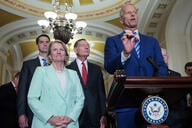You have /5 articles left.
Sign up for a free account or log in.
Which industry does higher ed most resemble: music, news or medicine? What do you think? We are endlessly fascinated by the story of how technology has disrupted these industries, displaced incumbents, and up-ended long established business models.
A good book on the failure of the music industry to adapt to the Web, digital music, and file sharing is, Appetite for Self-Destruction: The Spectacular Crash of the Record Industry in the Digital Age. Two other books that are on my reading list (but unfortunately do not exist in audio) are: Losing the News: The Future of the News That Feeds Democracy and Newsonomics: Twelve New Trends That Will Shape the News You Get. (Has anyone read these two books on the news business? Any other recommendations?).
In trying to understanding how education will be disrupted by technology we are naturally drawn to the examples of medicine and the news. Will we suffer the same fate as the music industry, as online educational materials and for-profit online institutions disintermediate, disaggregate and unbundle our core products? Will the traditional faculty career (tenure track etc.) become as rare as the newsroom print journalist?
I'm thinking, however, that the closest analogue to higher ed is health care.
1. A Diagnosis is Like a Diploma: Only our Dr. can bestow on us a medical diagnosis. This diagnosis is important because it is the label that determines how our insurance companies pay for our medical services. No diagnosis, no reimbursement. The product that higher ed. provides is the credential. We have a monopoly on providing the degree. No doubt someone can get a pretty good education by hanging out in the library, or hanging around campus and sitting in on classes, or even consuming course material on the Web. These activities, however, do not lead to a degree - and a degree remains a valuable commodity in the labor market.
2. High and Rising Costs: Costs for both education and health care have risen at much faster rates than both wages and inflation. We are both the beneficiary and the victim of sustaining innovations. Computer networks and MRI machines, fancy gyms and CT guided needle biopsies are all wonderful advances. But all of these are expensive, and none of these technologies fundamentally disrupt the education or medical experience. Issues of both cost and access for health care and education are intractable problems that seem immutable to policy and legislative action.
3. Distributed Payers: Costs for both higher education and health care are not always transparent, nor paid directly by the consumer. Public colleges and universities receive a significant (if diminishing) share of their revenues from public tax dollars. Medicare (and to a lesser extent Medicaid) account for large chunks of health care spending. Private institutions rely on tuition for only a portion of their expenses. Medical insurance aggregates risk (for those who are lucky to have insurance), while often obscuring fees.
What other ways are medicine and academia similar? (Doctors and professors? Online medical information and online educational materials? Two-tiered systems?) How are the two industries different?
Unlike music labels or print newspapers, there is little danger that either health care or higher education will disappear. Rather, the risks are spiraling costs, decreased access, and an erosion of quality. Left up to market forces alone, neither health care or education will provide adequate services. As a society we pay one way or another for poor health and inadequate education. Both domains require public investment and enlightened public policy. The music industry and newspapers continue to fascinate, but I wonder how much their pasts teach us about our future.




